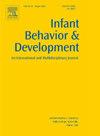Effects of a video-feedback intervention on parenting behavior and state anxiety in mothers of children with neurodevelopmental disabilities
IF 1.9
3区 心理学
Q3 PSYCHOLOGY, DEVELOPMENTAL
引用次数: 0
Abstract
Neurodevelopmental disability (ND) poses a significant challenge to infants' socio-emotional and cognitive development, as well as to caregiving dynamics, such as parental sensitivity and mother-infant interaction. Prior research highlights the crucial role of early parenting support interventions in enhancing parental behaviors, serving as a protective developmental factor for children at risk for or diagnosed with ND. This single-cohort, multicentric study aims to evaluate the efficacy of early video-feedback intervention (VFI) in improving maternal parenting behaviors. Thirty-four mothers with their children diagnosed with ND participated in the study. Different dimensions of parenting behavior (i.e., affection, responsiveness, encouragement, teaching) were assessed during 10-minute mother-infant interactions, both before (T0) and after (T1) completing six weekly VFI sessions. Additionally, mothers completed standardized questionnaires assessing parenting stress, anxiety, and depressive symptoms. The results indicated significant improvements in maternal responsiveness, encouragement, and teaching following the intervention. Furthermore, mothers reported a state anxiety reduction at T1. Additionally, higher scores in affection and responsiveness were correlated with reduced maternal stress. These findings support the utility of VFI as a valuable tool for enhancing positive parenting skills in the context of ND, and provide insights into the dyadic processes through which parenting behaviors may promote socio-emotional and cognitive development in children with ND.
视频反馈干预对神经发育障碍儿童母亲教养行为和状态焦虑的影响
神经发育障碍(ND)对婴儿的社会情感和认知发展以及照料动态(如父母敏感性和母婴互动)提出了重大挑战。先前的研究强调了早期父母支持干预在增强父母行为方面的关键作用,作为有患ND风险或被诊断为ND的儿童的保护性发育因素。这项单队列、多中心研究旨在评估早期视频反馈干预(VFI)在改善母亲育儿行为方面的效果。34位母亲带着诊断为ND的孩子参加了这项研究。在完成六周VFI课程之前(T0)和之后(T1),在10分钟的母婴互动中评估父母行为的不同维度(即情感、反应、鼓励、教学)。此外,母亲们还完成了评估养育压力、焦虑和抑郁症状的标准化问卷。结果表明,在干预后,母亲的反应能力、鼓励和教学都有了显著的改善。此外,母亲们在T1时报告了焦虑状态的减少。此外,情感和反应性得分较高与母亲压力减少相关。这些发现支持了VFI作为在ND背景下提高积极育儿技能的宝贵工具的作用,并提供了对育儿行为促进ND儿童社会情感和认知发展的二元过程的见解。
本文章由计算机程序翻译,如有差异,请以英文原文为准。
求助全文
约1分钟内获得全文
求助全文
来源期刊

Infant Behavior & Development
PSYCHOLOGY, DEVELOPMENTAL-
CiteScore
4.10
自引率
4.80%
发文量
94
期刊介绍:
Infant Behavior & Development publishes empirical (fundamental and clinical), theoretical, methodological and review papers. Brief reports dealing with behavioral development during infancy (up to 3 years) will also be considered. Papers of an inter- and multidisciplinary nature, for example neuroscience, non-linear dynamics and modelling approaches, are particularly encouraged. Areas covered by the journal include cognitive development, emotional development, perception, perception-action coupling, motor development and socialisation.
 求助内容:
求助内容: 应助结果提醒方式:
应助结果提醒方式:


